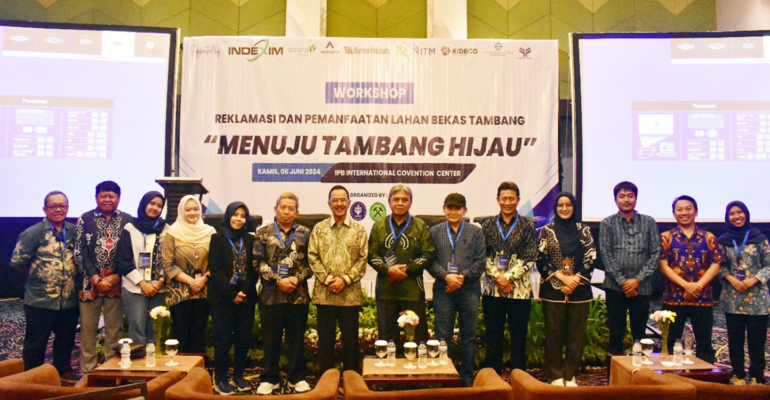Reklatam IPB University and Ika Minerba Hold Workshop on Reclamation and Utilisation of Ex-Mine Land

The Centre for Mine Reclamation Studies (Reklatam) of IPB University together with Ika Minerba held a Workshop on Reclamation and Utilisation of Ex-Mine Land, held at the IPB International Convention Center (IICC), Bogor. Two IPB University experts, Dr Suwardi and Dr Iskandar were present as resource persons to give presentations.
Dr Suwardi as the Head of IPB University’s Centre for Reclamation Studies explained the importance of calculating carbon stocks and inventorying greenhouse gas (GHG) emissions on post-mining land. This step is to develop emission reduction strategies on ex-mining land. Carbon trading in all sectors is planned to start with a carbon tax in 2025.
Furthermore, Dr Iskandar explained that ex-mining land reclamation techniques have different top soil characteristics and require appropriate amelioration. For example, for former nickel mine land that has very thin top soil, a Calcium (Ca) to Magnesium (Mg) ratio of less than one (Ca/Mg<1) requires planting techniques with a potting system, the addition of lime to increase Ca content and the addition of compost. “But the challenge is how to procure quality compost,” he explained.
Director of Mineral and Coal Engineering and Environment (Dirtekling Minerba), Directorate General (DG Minerba), Sunindyo Suryo Herdadi, ST, MT, in his speech said that the current global trend encourages the strengthening of Environment, Social, and Governance (ESG) principles in the mineral and coal mining subsector to control environmental and social impacts.
“In the mineral and coal mining subsector, in accordance with Appendix IV of the Minister of Energy and Mineral Resources Decree No. 1827.K/30/MEM/2018, there are regulations regarding reclamation programmes in other forms of the production operation stage, which can be implemented in the form of revegetation or other designations such as residential areas, tourism, water sources, and cultivation areas,” he added.
At the workshop, a representative from PT Adaro Indonesia, Suhernomo, explained his experience in mine reclamation at the company. “Sustainable innovations include protection and improvement of proboscis monkey habitat, development of local fisheries and kelulut cultivation,” he said.
Other innovations include the enrichment of Kalimantan’s endemic fruit plants, ecoriparian management, coffee plant conservation, the creation of a ficus arboretum, the Ecological Green Belt (EGB) programme, as well as the creation of a bamboo arboretum and the development of aquaculture and water flow research in the Nungkaran River.
The management of reclamation at PT Antam was described by Ismail, ST, MM (Health Safety Security and Environment Division Head). He explained that PT Antam uses the concept of Good Mining Practices (GMP) with the implementation of the ‘Antam Green Standard’.
“The reclamation technique carried out by PT Antam that distinguishes it from other companies is the monitoring of terrestrial biota and the use of technologies such as cocomesh, hydroseeding, and the use of tankos to improve soil fertility and erosion control,” he said.
The workshop produced a range of cutting-edge knowledge and technology in the implementation of ex-mining land reclamation for environmental conservation. Success criteria for mine reclamation for other uses such as agriculture, tourism, housing, and others need to be prepared immediately. Collaboration between the government, academics, mining practitioners, and research and development (R&D) teams needs to be improved to increase the success of mine reclamation. (*/Rz) (IAAS/RUM)



